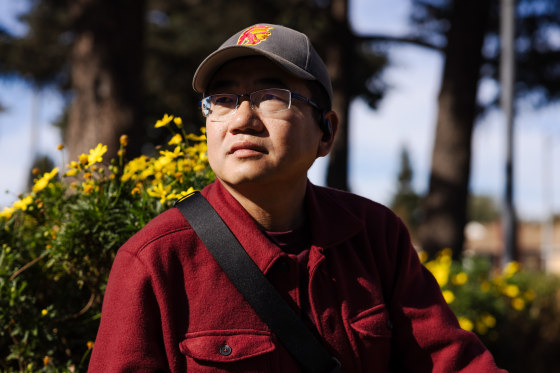Kevin Yang, a 46-year-old undocumented immigrant from China, said he once felt a sense of indebtedness toward the United States, but now, with President-elect Donald Trump’s second term on the horizon, he feels fear.
“The gratitude I once felt toward the U.S for accepting me into the country … has now shifted to anxiety and fear, Yang said. “And I know others in my situation feel the same.”
With the incoming Trump administration looking to prioritize deporting Chinese nationals, citing national security concerns, many undocumented Chinese men say they couldn’t feel further afield from the reasoning behind the potential policy — that Trump thinks they’re assembling an army within the United States.
Several Chinese undocumented migrants who made the trek across the southern border to the United States spoke about Trump’s mass deportation plans. Sources close to the Trump campaign had exclusively told NBC News that undocumented Chinese immigrants who are deemed to be of military age will be among the first groups targeted. But, having fled their homeland because of political persecution, or uprooted their lives for better economic opportunities, many undocumented Chinese men reject the notion of being a threat to the United States as absurd.
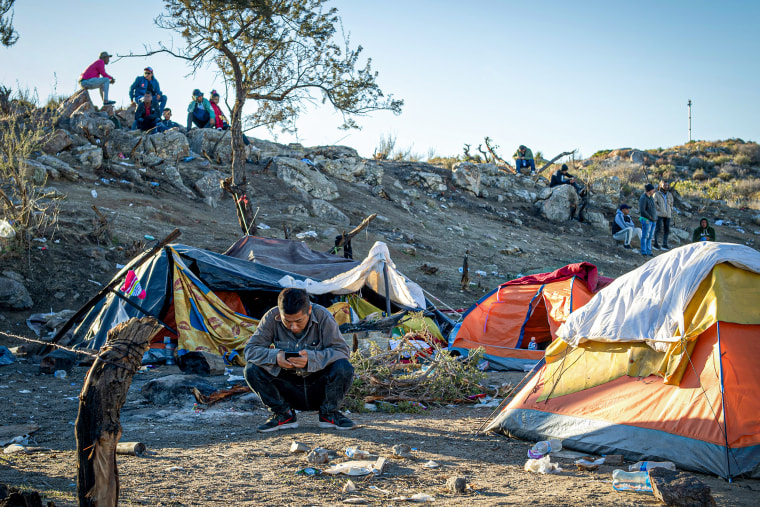
“We’re not military spies. Do you see anyone buying heavy weaponry or weapons here?” Yang said. “The fact that Trump says this is completely crazy.”
Trump’s transition team did not respond to NBC News’ request for comment.
If indeed focused on immigrants of Chinese descent, Trump’s deportation policies are likely to be challenged legally as a blatant example of racial profiling. But experts note that, after having attempted versions of these policies in his first term, and emboldened by growing support among the public, Trump could be more successful implementing them this time around.
“I expect that we will see ICE raids that are carried out for the purpose of terrorizing immigrant communities and where the purpose is inflicting cruelty on immigrants,” Elora Mukherjee, director of the Immigrants’ Rights Clinic at Columbia Law School, told NBC News.
While Asian immigrants have long been the fastest-growing undocumented population, the number of Chinese nationals crossing into the United States in particular has skyrocketed in recent years. Between fiscal years 2022 and 2024, the number of undocumented Chinese nationals crossing both the northern and southern borders has tripled, from just over 27,000 to more than 78,000.
Experts and undocumented immigrants have said that China’s economic downturn and political friction, which came to a head during the country’s prolonged Covid-19 lockdowns and restrictions, were largely the basis of the migration wave. But Trump has repeatedly suggested that “military-age” men are conspiring to build an army.
“They’re coming in from China — 31, 32,000 over the last few months — and they’re all military age and they mostly are men,” Trump said in April during a campaign rally. “And it sounds like to me, are they trying to build a little army in our country? Is that what they’re trying to do?”
And on a Dr. Phil podcast episode released in early December, Trump’s incoming “border czar” doubled down on such comments.
“Sixty thousand Chinese males, mostly military age, do not leave China without the coordination and approval of the Chinese government,” said Tom Homan, who was the acting director of Immigration and Customs Enforcement during Trump’s first term in office. “This is a coordinated national security vulnerability that the Chinese government is involved in.”
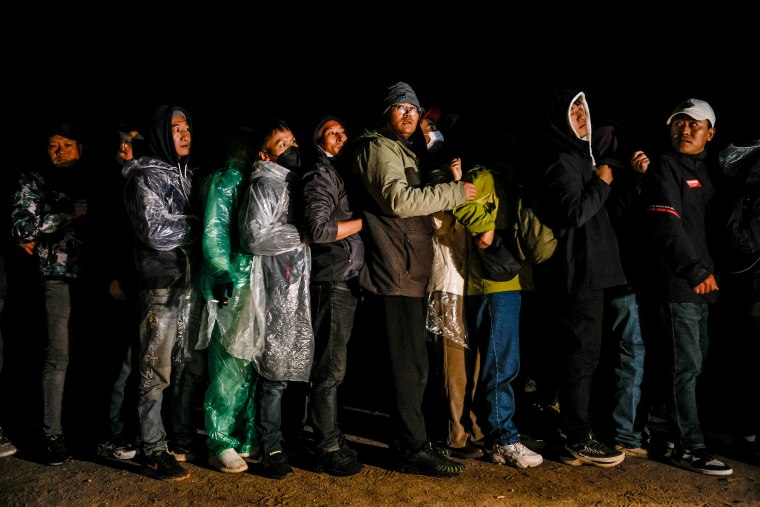
Navigating an uncertain future with their families
Bin Wei, a 50-year-old who immigrated with his teenage son, came to the United States by way of the Darien Gap, a land bridge filled with dense jungle between South America and Mexico. He said that immigrants like himself only make the dangerous trek so that they can establish more stability for their families — “not for any kind of military or violent reasons.”
“We left a hard and oppressed life — harder than many people in the U.S. can imagine,” Wei said of being painted as an adversary. “All we want is freedom to make life better for us and our kids.”
With Trump’s campaign promises casting uncertainty over his future, Wei said he’s been acting in accordance with the Chinese motto, “follow the correct and law-abiding path.” And he’s also been recommended to remain in California, a sanctuary state in which no state and local resources can be used to aid federal immigration enforcement.
“Chinese language media is telling us all to watch ourselves, to do everything by the book and the law, because Trump will find any excuse to deport us,” he said.
But Wei, who currently lives in Southern California, said he’s most worried about his son. Trump’s policies, Wei worries, could have long-term, far-reaching effects on the teen’s life.
“He’s the entire reason why we came to the U.S.,” Wei said. “To think about any kind of diminishing future for him makes me really sad and angry.”
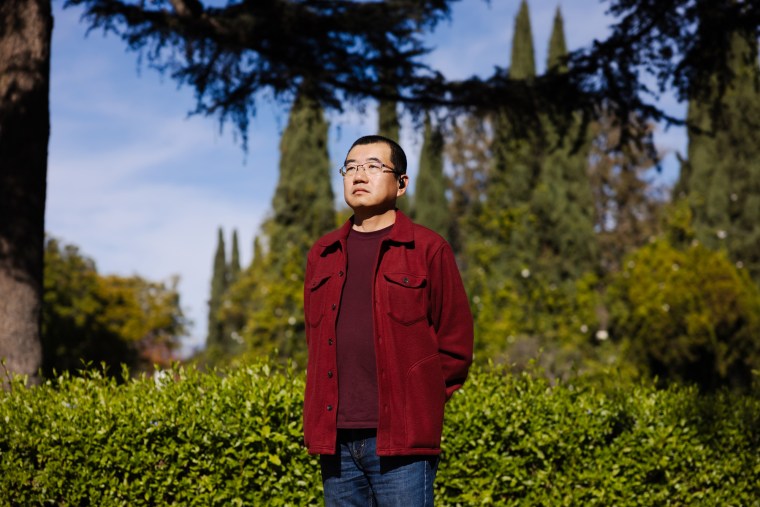
Trump’s policies feel eerily similar to the political situations many have fled
Yang, who made the journey across the border in 2022, said he was a city representative back in China and fled after clashes with the Chinese government led to his political persecution. He said he traveled into the United States by foot through a remote, barren area of the desert, weathering severe dehydration before being picked up by Border Patrol agents. Trump’s election has left him “deeply saddened and helpless,” he said.
Yang said much of the president-elect’s campaign promises smack of the political leadership that he fled from.
“Their proposed policies such as establishing large-scale detention camps for illegal immigrants and deploying the military to deport immigrants is disturbingly similar to the methods used by dictators like Xi Jinping,” Yang said.
Yang added that the “disregard for any kind of laws or regulations” from the Trump administration also feels similar to the authoritarian regime in China.
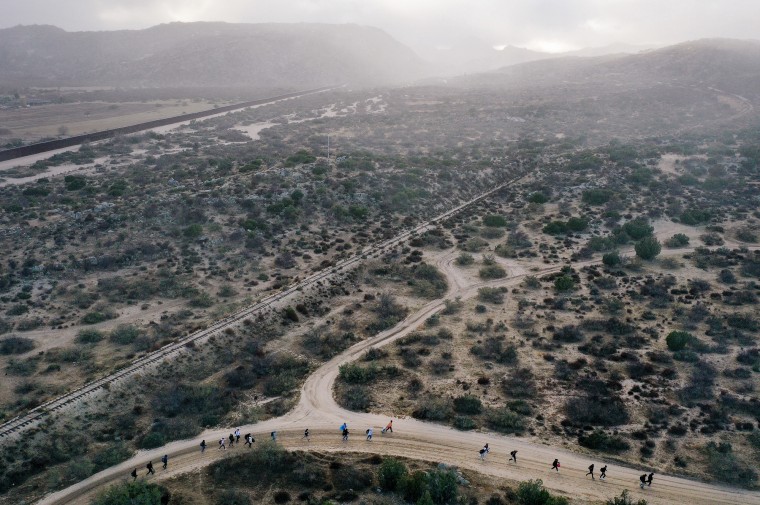
Trump’s mass deportation policies are sure to meet pushback
Trump’s targeting of Chinese immigrants is likely to face legal pushback, including accusations of racial profiling, especially if Immigration and Customs Enforcement raids ramp up as they did in his first term, Mukherjee told NBC News.
“Simply from looking at a person, it is impossible to know if they are a U.S. citizen or not,” said Mukherjee, the clinic director at Columbia Law School. “As ICE agents carry out raids, they will sweep a large number of people into their drag net, including those with lawful status in the United States.”
Early in his first term, Trump escalated the number of workplace raids, targeting a string of Asian restaurants in central Mississippi, for example, among many other sites. This time around, Trump has been looking to broaden the types of places ICE agents can sweep, with several sources exclusively telling NBC News that he intends to rescind a policy that prevents these agents from arresting immigrants in houses of worship and schools among other “sensitive” areas without approval from supervisors.
“I don’t say this to be alarmist,” Mukherjee said, urging undocumented immigrants to apply for immigration relief and learn their rights. “I just think that people need to be prepared.”
Mukherjee said that people should take precautions to avoid arrest and detention, including refusing to open the door to any strangers unless they show a judicial search warrant. And if an immigration officer or law enforcement approaches them in a public location, she said, undocumented immigrants still have the right to remain silent.
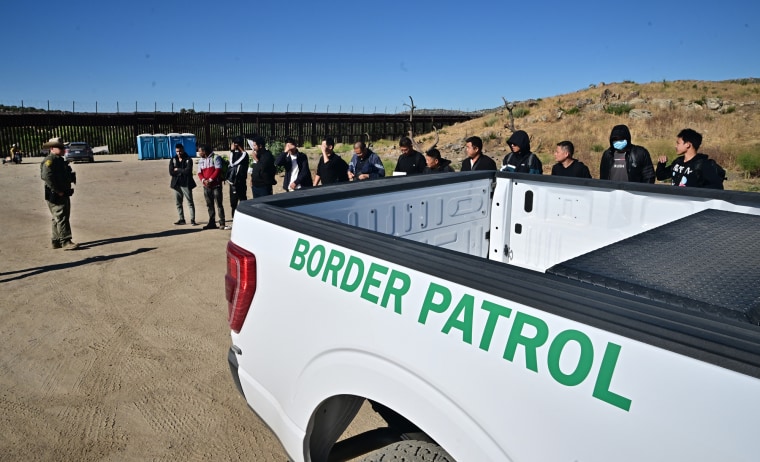
“You don’t need to say where you were born. You don’t need to answer when you entered the country. You should try to stay calm,” she said. “You shouldn’t sign anything without speaking with a lawyer first and reviewing the paperwork with a lawyer.”
Los Angeles-based attorney Frank Hwu, who’s represented thousands of Chinese undocumented immigrants, also noted that while Chinese undocumented immigrants who have immigration relief secured or pending are unable to be deported without their day in court, they can still be detained. And this has made some of his clients now fearful of checking in with ICE, an otherwise routine, regular appointment that most have complied with since entering the United States.
“You don’t want to be detained while you’re waiting for court, because the court process takes years,” Hwu said, adding that he had a client who was detained for six months. “They’re here with their children, with their moms and grandmas.”
The potential of being repatriated has left many undocumented immigrants anxious about returning to China. Hwu said many of his clients aren’t fearful of going back to difficult life conditions as much as they are of the unknown consequences of their illegal immigration.
On most days, Wei says he doesn’t even allow his mind to go there.
“Speaking for myself, I am very afraid of going back to China,” Wei said. “There is no doubt that the government will not be happy with me, and that I will be punished severely.”
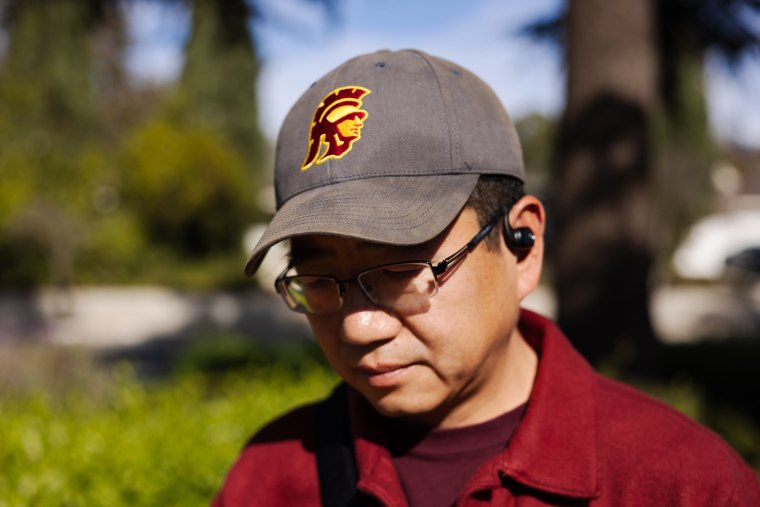
China has not been so open to accepting repatriated immigrants in the past. But the Chinese Foreign Ministry said in a statement to NBC News that the country will be cooperating with efforts to repatriate undocumented immigrants, accepting repatriated individuals who are confirmed to be Chinese citizens through their verification process.
“As a matter of principle, the Chinese government firmly opposes all forms of illegal immigration and has engaged in practical cooperation with immigration enforcement agencies of relevant countries, including the United States, achieving positive results,” the country’s foreign ministry said.
And in December, the Department of Homeland Security conducted its fourth large-frame charter removal flight in less than six months to China.
Along with prioritizing the deportation of military-age Chinese immigrants, Trump has promised to end birthright citizenship, stripping rights from those born in the country to undocumented parents. The Trump transition team is also compiling a list of countries, including Turks and Caicos and the Bahamas, to which it may deport migrants whose home countries refuse to accept them.
Ultimately, Yang said, Trump has gotten it all wrong.
“The Chinese people that I encountered crossing illegally into the United States have a simple purpose: To find a place where they can survive,” Yang said.
